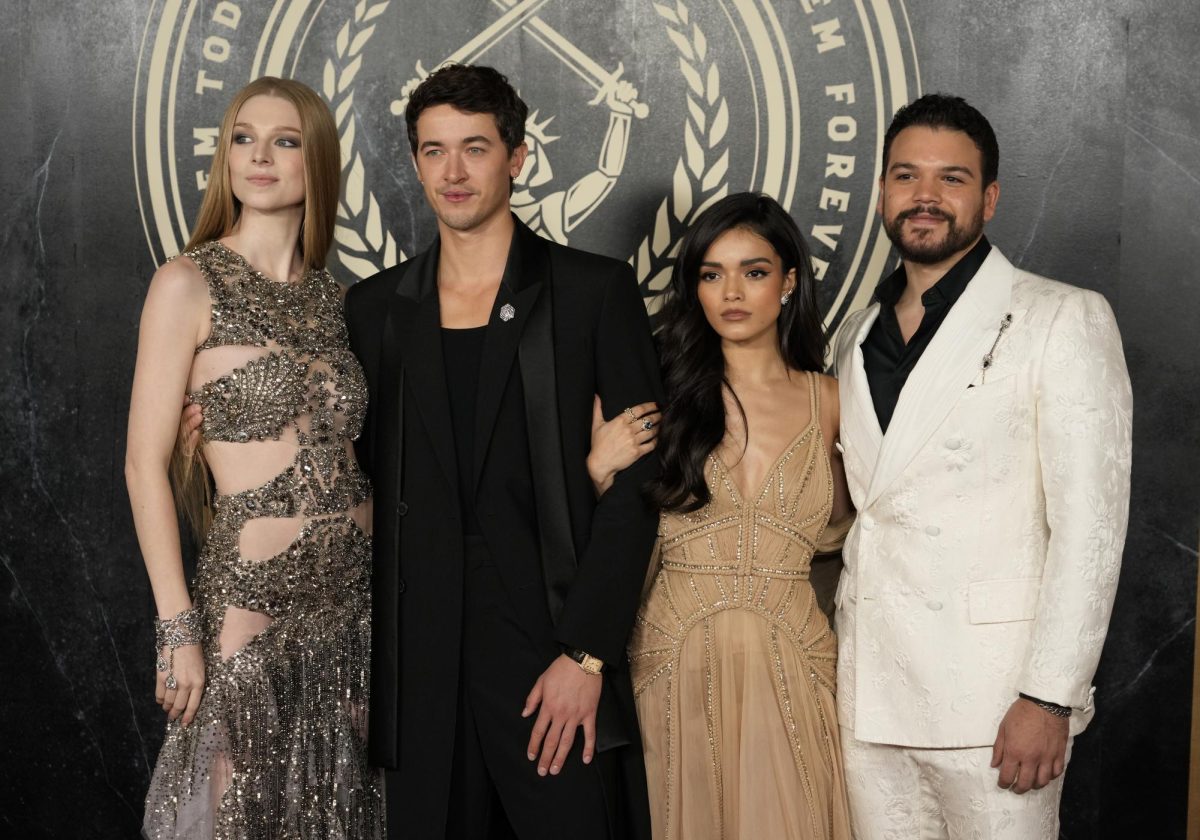“The Hunger Games” franchise has slithered its way back into mainstream media with the release of the prequel “The Ballad of Songbirds and Snakes.”
Directed by Francis Lawrence, “Ballad” follows a young Coriolanus Snow (Tom Blyth), future president of Panem, in his time as a student mentor in the tenth annual Hunger Games, where he is assigned to the female District 12 tribute, Lucy Gray Baird (Rachel Zegler). Determined to win the prize money offered to the best mentor, Snow does everything in his power to get Lucy Gray as much attention from the Capitol as possible, twisting the rules of the games in the process.
In this three-part film, the watcher follows the steady corruption of Snow’s character as he is pulled in opposite directions by his good and hopeful “songbird,” Lucy Gray, and his psychotic mentor Dr. Gaul (Viola Davis), who is the head gamemaker of the Games.
Though there is much plot-propelling action in “Ballad,” the story of Snow’s descent into evil is largely dialogue-driven. The film successfully dissects the descent through the eyes of the people who love him, or at least used to.
Near the start of the film, the viewer sees Snow in conversation with his friend Sejanus Plinth (Josh Andrés Rivera), his cousin Tigris Snow (Hunter Schafer) and Lucy Gray. Arguably, these are the people who trust Snow the most. With them, Snow exudes boyish charm and a lovable eagerness to prove himself.
But at the end, when he has decided to “land on top” by whatever means necessary, we see these characters in one-on-one conversation with him again.
He argues with Sejanus about his allegiance to the Capitol. Tigris tells him he looks like his father, whom she has long disapproved of. Most memorably, Lucy Gray realizes he is beyond saving when he lets slip that he previously lied to her about how many people he killed.
These conversations are impactful in part because of a moving script, but credit must also be given to Blyth’s mastery in the role. Being one of the up-and-coming actor’s bigger roles, Blyth’s performance as Snow could not have been easy to conquer.
Given the circumstances of his post-war life, Snow undergoes significant changes throughout the movie. In part one, Blyth exudes empathy through Snow’s character, who creates deep connections with many others and sacrifices his well being for the success of Lucy Gray in the Hunger Games. Snow leaves for the Games in the beginning of the film, hopeful to win the prize money for his family. He tells his grandmother and cousin, “Snow lands on top.”
Though still relatively early in his career, Blyth has proved to have mastered the art of subtlety. Part of what makes Snow’s transformation so chilling is how slow his character changes. It’s almost unnoticeable until Blyth redelivers his line in part three, menacingly telling Dean Highbottom (Peter Dinklage), “Snow lands on top.”
These lines are particularly interesting because, despite their different meanings and deliveries, they’re identical and contribute to the deconstruction of Snow himself.
Embodying the Joan Baez-esque Lucy Gray is Rachel Zegler, who delivers clever and witty lines in a country twang that makes the audience immediately root for her. Zegler’s capability to charm shines through in the nearly 3-hour runtime.
From the moment Lucy Gray is introduced, Zegler radiates an immediate familiarity within the character that makes her so loveable. In this fictional world full of betrayal and mistrust, Zegler was the perfect actress to serve as, what seems to be, the sole silver lining in Panem.
Lucy Gray is filled with sympathy and logic, which makes her arguably the most relatable and personable character in “Ballad.” She has no moments that are questionable or frustrating and is a realistic, humane character that the audience can easily relate to, making her endlessly watchable.
Zegler’s performance confirms the old time charm that she has shown in the 2021 remake of “West Side Story.” She has proved to audiences exactly why she is becoming a household name.
But this film would be nothing without its ballads and songbirds, the most notable of which being the original songs written into the book series.
Lucy Gray, the “songbird,” vocally soars over the lilting acoustic guitar in the original tracks, “Nothing You Can Take From Me,” “Pure As The Driven Snow,” “The Ballad of Lucy Gray Baird” and “The Old Therebefore.”
Zegler’s voice was perfectly suited for this role, and she expertly wove her own musical theater background into the classic Appalachian instrumentation of District 12. It makes it even more impressive that all of her singing was done live on the days of shooting.
All the instrumental tracks were scored by James Newton Howard, who has collaborated on the composition of the tracks for the four previous movies in the franchise. Though the final movie was released eight years ago, the consistency in composition established a familiarity between the new and the old.
The film achieved a Box Office rating of No. 1 when it hit theaters. Its subtle symbolism and inspection into human behavior, paired with the phenomenal execution of acting and music leave no doubt: “The Ballad of Songbirds and Snakes” is the deserving victor.


